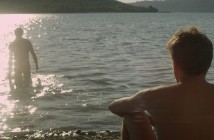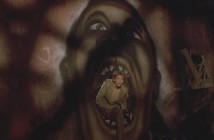
Editor’s Note: Reviews this week are by Ronan Doyle and Jose Gallegos
It’s that time of the week again—shush you, the time shifts depending on how busy we are—and here we are with your Netflix reviews. The steady drip of 2014 releases continues, another pair arriving this week to add to what should be, by year’s end, another bursting-at-the-seams array of catch-up material. 2013 releases are forthcoming too; indeed it’s a rather recent assortment of movies this time around, with only a single title casting us back more’n a decade ago.

All Things to All Men
Bearing the kind of title that’s just asking for trouble, Kidulthood-Adulthood producer George Isaac’s directorial debut isn’t any less uninspired under the alternate title of The Deadly Game, but it’s at least then not an outright lie. All Things to All Men is few to any, a desperately bland crime thriller that’s barely memorable to the beginning of the closing credits, never mind their end. Gabriel Byrne growls and scowls his way through Isaac’s dreary dialogue while a host of capable supporting players enact a heist around him, each apparently as aware as Byrne of how utterly unremarkable the movie is. Fleeting distraction, and not of the good sort, comes from a score of inappropriate energy by the unfortunately named Thomas Wanker; his recent work with Roland Emmerich—on which he was credited, not for no reason, as Wander—was as unremarkable as the film he now overruns. AVOID IT. ~RD

A Touch of Sin
“Episodic” is less a criticism of A Touch of Sin than a simple statement of fact, but if Jia Zhanke’s disarmingly violent tetraptych seeks strength in numbers where its observations are concerned, it also finds its insights diluted by the bare repetition of these four not-dissimilar stories. Still, it’s all under the auspices of a director with masterly control; like the roving cameras that linger long on the lasting effects of the violence to which each tale builds, Zhanke’s gaze is unflinching and all the more powerful for it. At its best A Touch of Sin is brilliant, an analysis of socially-engrained violence with touches of Puiu’s Aurora or Haneke’s 71 Fragments of a Chronology of Chance, yet all the while unmistakeably its own beast. Elsewhere it’s just indulgent, an are-you-getting-this-yet overstatement of intent that excuses itself by virtue of the consummate craft with which it’s mounted. RECOMMENDED. ~RD

Bastards
“Typical” isn’t a word one might think to associate with acclaimed French auteur Claire Denis, and for good reason: Bastards, if trading in the kind of narrative aspects not uncommon among Francophone thrillers, bears the distinctive marks of its maker in the seething sexuality so often underlying her work. Yet as Denis’ movies go, this tale of a sailor returning to land in the wake of his brother-in-law’s suicide tends to feel terribly tepid at times. Vincent Lindon broods like nobody’s business in the lead, joining Chiara Mastroianni as the wife of the businessman whose overhanging debts may have driven the dead man to take his life, both actors struggling to uphold the sinister atmosphere Denis shoots for. Her assured control and a typically strong Tindersticks score just about manage to keep things in check, but Bastards lingers long on the edge of collapse, threatening any moment to give in to its story’s sillier aspects. WORTH WATCHING. ~RD

Bedrooms and Hallways
Who doesn’t like a trashy love story every once in a while? I myself indulge in gay romance movies, mainly because a large majority of them are so tacky and cheesy. Rose Troche’s Bedrooms and Hallways is a good example of the appeal of cheesy gay romance movies: a meek protagonist; his devoted/oversexed friends; ugly ‘90s shirts and hair; and random cameos by Hugo Weaving. Troche’s film had potential to be one of my cheesy favorites, but I couldn’t get over the offensive material. I’m fine with a story of a gay man falling for a seemingly straight guy, but when your film relishes in machismo, converts straight men into bisexuals at the drop of a hat, and, on top of that, transforms a gay man into a bisexual at the sight of his high school beard, then I have a problem. In the words of one of my favorite drag queens, Alyssa Edwards: “Uh uh, no ma’am!” I’m over it! AVOID IT. ~JG

Beyond Outrage
If, as its fans claimed, Takeshi Kitano’s Outrage was the director’s cynically self-aware return to the genre that made him famous after three less-than-successful efforts outside it, its sequel must be the self-hating outcome of that predecessor’s success. Stripped of the tongue-in-cheek comedy that made the first film fun even amidst the underdone plot machinations that paved the way for its violence, Beyond Outrage plods through a narrative that’s little more than lines joining together the disparate dots of bloody set pieces. Betrayals and bloodshed are par for the course in another gangster saga whose characters aren’t defined beyond the allegiances we’re to wait for them to betray. Kitano’s character’s reluctance to join the fray might well reflect the director himself: begrudgingly roped in to going back to what he’s good at, fulfilling his function with nary a smile on his face. It’s very well-made, and very wearily too. SO-SO. ~RD

Everyday
Between the striking versatility with which his hugely diverse projects are brought to life and the oft-absurd speed with which he churns them out, it’s not for no reason that Michael Winterbottom might seem sometimes like the British Isles’ answer to Richard Linklater. He cements the comparison, not to mention the distinction it draws between the directors, with Everyday, a family drama shot intermittently over the course of five years to allow its child cast to naturally age before our eyes. Where Boyhood, by all accounts, is brilliant fruit borne of this long-form shooting style, alas in the case of Everyday it amounts only to an awful lot of wasted time. John Simm and Shirley Henderson are terrific, the latter especially, as a couple kept apart when the former’s incarcerated for unsaid crimes. Sean Bobbitt offers further proof that he’s the DP to watch, but Winterbottom’s move for naturalism loses itself in a script that forgets the everyday isn’t always all that interesting. SO-SO. ~RD

Insidious: Chapter 2
James Wan’s Insidious: Chapter 2 follows immediately after the events of the first Insidious, looking at what happened to Josh Lambert (Patrick Wilson) when he saved his son from the spiritual world. What unfolds is lackluster at best. The original was brilliant because it built up suspense and tension, which snapped at the last moment. Insidious: Chapter 2 tries to recreate that magic by establishing Quantum Leap-like rules for the ghost world, beating up Rose Byrne at any given opportunity, and deciding that Lin Shaye has the perfect matronly voice for a blonde 20-something year-old. My personal issue with movie franchises, like the Insidious series, is that they don’t know when to end. Producers saw a potential cash cow and decided to milk it to the last drop, no matter how bad the follow-up was. It’s a pity since the first film opened up so many fantastic opportunities that Chapter 2 squandered, and now there is confirmation that there will be a Chapter 3…ugh! AVOID IT. ~JG

Let the Right One In
Decry Twilight all you like: the melodrama was worth it for a world in which Let the Right One In earned attention for its alternate take on vampire lore. Thomas Alfredson’s breakthrough is a horror movie masterpiece, its tremendous treatise on childhood isolation as striking as a drop of blood on the Stockholm snows. Alfredson’s aesthetic control is astonishing, he and cinematographer Hoyte van Hoytema serving John Ajvide Lindqvist’s self-adapted novel superbly with a haunting wealth of tableaux vivants painting these characters upon the oppressive backdrop of wintry landscapes and suburban monotony. The tender melancholy that roots the movie’s horrors finds expression in the extraordinary work of first-timers Kåre Hedebrant and Lina Leandersson, two actors who embody the terrible loneliness of childhood as well as any ever have. Here is a vampire movie par excellence, a film whose terrible, terrific sadness reminds us how much about being human we have to learn from those who are not. HIGHLY RECOMMENDED. ~RD

Milius
Conspicuously keeping its subject off-screen without explanation as though expecting us to be shocked when his fate’s revealed, Joey Figueroa and Zak Knutson’s documentary profile of ‘70s cinema renegade John Milius isn’t as well-conceived as even the worst of his work, but it’s a fitting tribute to a singular screenwriter all the same. That’s the role for which he’s best remembered, his contributions—credited or no—to Jaws and Apocalypse Now ensuring a cabal of collaborators like Spielberg and Coppola are keen to rush in with reminiscences of the politically problematic filmmaker’s larger-than-life persona. Their stories, and those of others like Scorsese and George Lucas, are to thanks for making Milius as watchable as it is; Figueroa and Knutson, meanwhile, are as reluctant to dig far into their focus as they are to frame anyone in anything approaching an interesting shot. Strange how movies about movies are often so utterly uncinematic. WORTH WATCHING. ~RD

The Dirties
There’s promise to spare in The Dirties, Matt Johnson’s determinedly daring found-footage school shooting film, and alas that remains the case once the movie’s over too. It’s a commendable concept, make no mistake, and one mounted with a mix of humour and heart that’s nothing if not impressively delicate. It’s also, though, a slave to the setbacks of so many its ilk where the teen video-cam diary conceit is concerned: be it in unlikely camera set-ups or awkward meta-movie minutiae, The Dirties reminds us consistently of its craft in a way something like Elephant—though crafted—never did. The result is a film that falls short of the naturalism and accompanying insight it seeks; Johnson’s film retains a certain boldness of approach and intent that ensures it a certain cult curio cache, but it’s a far cry from the kind of brilliant breakthrough it might—it should—have been. SO-SO. ~RD

When Jews Were Funny
Alan Zweig’s When Jews Were Funny is a talking head documentary that tries to prove that older Jewish comics were the owners of comedy. Had the thesis of comedic ownership been developed from the interviews, I would have felt the documentary was compelling, but when the interviews are developed as the result of the director’s unflinching stance on the subject, then I have a problem. Zweig first tries to prove his point by interviewing older Jewish comics, but once those comics become annoyed with Zweig’s assertions, Zweig turns his camera to younger Jewish comics who adore their predecessors. It is biased filmmaking that doesn’t allow its subject to breathe and take form. Zweig had a particular destination in mind when he conceived this documentary, and he hangs onto that problematic goal in spite of his subjects constantly mocking his viewpoint. It’s not documentary filmmaking, it’s just a man trying to prove that he’s right. AVOID IT. ~JG



